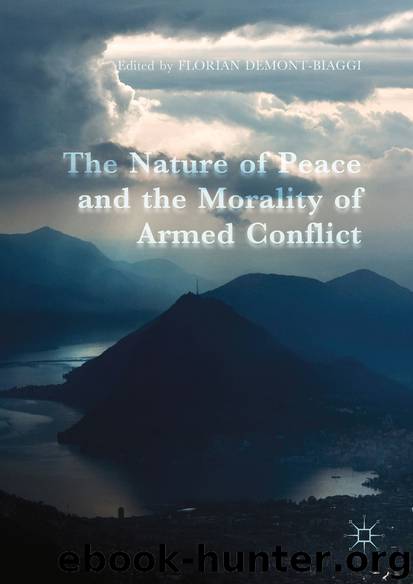The Nature of Peace and the Morality of Armed Conflict by Florian Demont-Biaggi

Author:Florian Demont-Biaggi
Language: eng
Format: epub
Publisher: Springer International Publishing, Cham
Compassion Protects
Compassionate intentions help avoid unnecessary harm to others, but also protect those that inflict harm. Killing based on unethical motivations is considered extremely harmful to the killer. This concern for the spiritual wellbeing of the warrior at first seems reducible to religious idealism. Earlier, we saw an ironic argument that generosity is self-interested, the more benevolent a king is, the more his domain prospers and the more his power waxes. This accords with the idea that compassion protects the compassionate; an idea that often extends into what we would consider magical thinking but is often commonsensical. On the magical side, compassion protects against everything from snakebites to arrows. The story of factional intrigue between Buddhist and anti-Buddhist queens in the court of King Udayana, a contemporary of the Buddha, is a good example. 23 Buddhist Queen Śyāmavatī is falsely implicated in an assassination attempt by an anti-Buddhist queen and the king decides to shoot her on the spot. However, as he aims at her heart, she fills it with loving kindness. The arrows reverse course at the king, and he is forced to consider her innocent. 24 There are many such examples, and Buddhists today recite the scripture on loving kindness, the Mettasutta , to protect themselves from harm; according to its commentary, the text was originally produced by the Buddha to protect monks from harassing negative spirits.
The practical side of this is the fact that negative emotions are harmful to their agents. Contrary to the current attention given to mindfulness in treating veterans with post-traumatic stress syndrome, it is compassion-generating practices that Buddhist texts claim remove nightmares and heal emotional wounds. Considering the psychological damage to individual soldiers and to a nation that may have to reabsorb large numbers of veterans into families and communities, not to mention police and intelligence organizations, this seems like a pragmatic concern.
Buddhists texts assure individuals that compassion will make them popular, successful and even victorious. Indian political theory was aware that power comes from the countryside, and that rulers cannot stand without the support of their people. Kings who oppress their people meet with destruction in this world and hell in the next. 25 Hatred weakens individuals, societies and states, while benevolence makes them strong. Hatred is rooted in stupidity and compassion is rooted in wisdom. Violence motivated by hatred, or greed is more likely to be ill advised and damaging even to the perpetrator. Force motivated by compassion is more likely to be carefully measured and pragmatically oriented toward producing the maximum good. As illustrated later, in the Mahāyāna theory of compassionate killing and warfare, compassionate intentions protect warriors from the karmic consequences of killing . This is in striking contrast to the usual tendency to empower violence through dehumanizing enemies.
As mentioned, the philosopher Candrakīrti was aware that ethical rationalization could be exploited by kings. But although he rails against such abuses, later in the same text, he gives many examples of killing with compassion. 26 This shows that cherry picking an apparently definitive passage is a mistaken approach to Buddhist thought.
Download
This site does not store any files on its server. We only index and link to content provided by other sites. Please contact the content providers to delete copyright contents if any and email us, we'll remove relevant links or contents immediately.
The Pirates of Somalia by Jay Bahadur(1626)
Political Theology by Carl Schmitt(1577)
The Holocaust: A New History by Laurence Rees(1521)
The Social Animal by David Brooks(1452)
A Practical Guide to International Arbitration in London by Hilary Heilbron(1434)
Restitution by Restitution(1424)
Pirates of Somalia by Jay Bahadur(1382)
Coercing Virtue by Robert H. Bork(1357)
The Nuremberg Interviews by Leon Goldensohn(1304)
Basic International Corporate Taxation by Sebastiano Garufi(1214)
A History Of Thailand by Baker Chris(1190)
International Trade and Business: Law, Policy and Ethics by Gabriël Moens & Peter Gillies(1137)
The Global Commons by Susan J. Buck(1137)
The Sovereignty of Human Rights by Macklem Patrick(1113)
Blood Profits by Vanessa Neumann(1113)
Asian Waters by Humphrey Hawksley(1113)
Spring Fever: The Illusion of Islamic Democracy by McCarthy Andrew C(1102)
The Nuremberg Trials: The Nazis and their Crimes Against Humanity by Roland Paul(1046)
Crimes Against Humanity: Historical Evolution and Contemporary Application by M. Cherif Bassiouni(1028)
